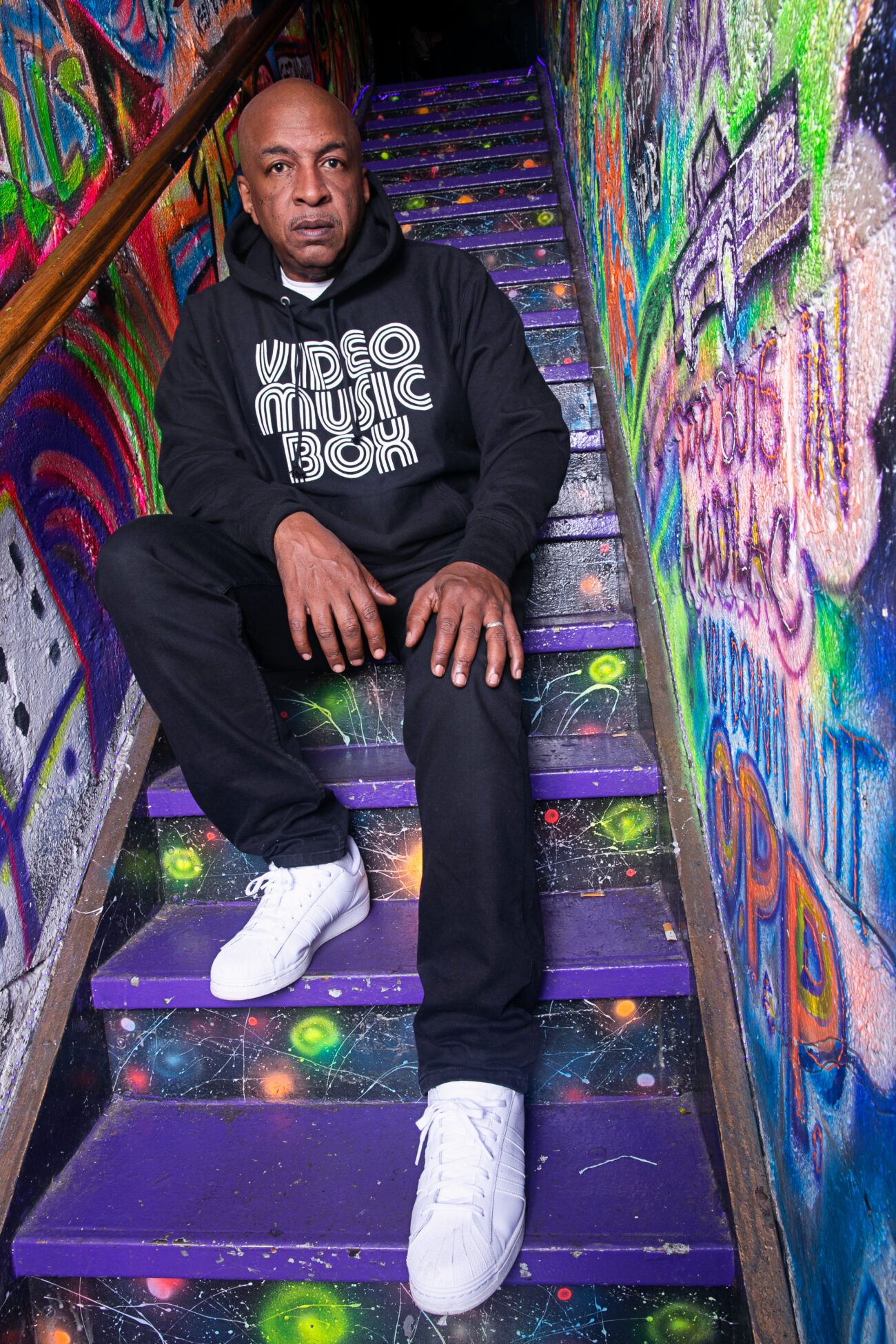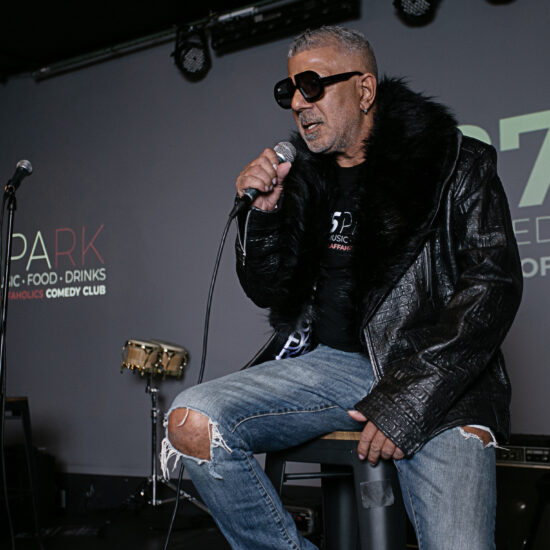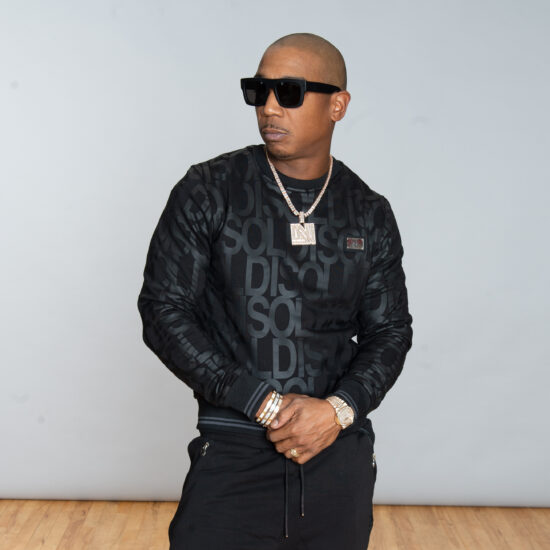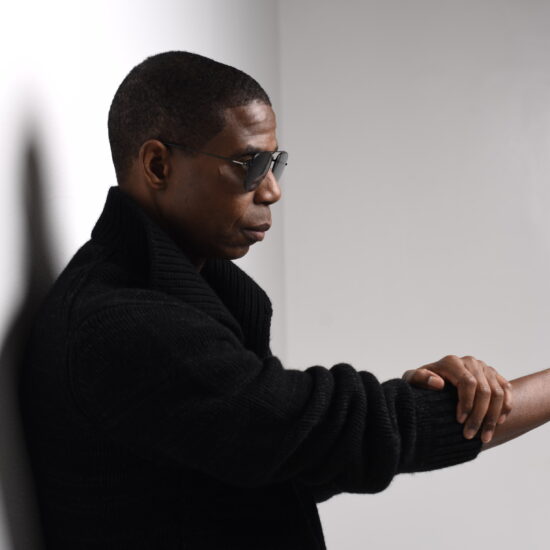Imagine if your side hustle evolved into a national gem and revolutionized an entire culture. In the 80s, Video Music Box was a baby born out of a necessity that nobody knew was there, except Ralph McDaniels. The legendary VJ created the paragon of music video platforms. Till present day, it is the longest running video music show in the world, with its footage used in countless documentaries. On the brink of Hip Hop’s monumental 50th birthday, the seasoned producer has been celebrating his first love properly. Starting with his Showtime documentary, You’re Watching Video Music Box, which premiered 2 years ago as part of Showtime’s Hip Hop 50 celebration; and now his Hip Hop Summit at La Guardia College. McDaniels is on a pilgrimage of preservation, ensuring that the half a century of Hip Hop history is not forgotten. Industry Rules sits with the evangelist of one of the most prismatic music genres and delves into the side hustle of decades.
RA: What was it like in the first few years when you really had to go hunting for those visuals to fit in that hour slot of Video Music Box?
RM: Folks were happy that I played their videos. They were happy to get it to me and put it in my hands. At that time, artists were happy just to get any type of air play that was possible because there was very little radio air play for hip hop and black artists in general. There’s definitely wasn’t air play for music videos which is what we focused on.
RA: You’re now in the process of digitizing hours worth of footage from Video Music Box, what does that entail?
RM: We have 20,000 hours worth of content that we collected over the last 40 years. A lot of the footage are on analog tapes which are big tapes that we used back in the days to record on. Many of them need to be restored on digital format so that we can put them online and use them to educate people and tell the story of Hip Hop. Then we have to go through them and look at each one in detail to figure what the location was, the year and identify who is that talking. Archiving and doing that work is very tedious because it’s in real time, but it’s work that needs to be done so we make sure that this exists forever.
RA: Do you find yourself walking down memory lane as you’re watching these videos?
RM: Yeah, there’s interviews that I’ve done that I forgot. I’ll be like I don’t even remember when I did this! But clearly I was there. It’s definitely walking down memory lane. The Video Music Box Collection which is my non profit is also involved in so many different things as far as education and working with HBCUs, working with museums and libraries around the country. Often when you see documentaries on FX, or on ABC and BET they come to us for help and do the research with us. It’s a lot of work and there’s not a lot of people who look like me that know how to do this type of work.
RA: Beside Music Box, you’ve been a part of so many iconic projects, from Juice to Wu Tang’s CREAM video, you’ve produced and directed. What do you like doing the best?
RM: I’ve gotten to like directing, I wasn’t really into it at first. I was more like, let’s set up the project, let’s secure the bag and let’s go forward to the next project. Now I take a little more time in directing. Some of the bigger projects I’ve done recently, I’m more of an executive producer on it and a little bit more hands on with the direction. Juice was actually the first film I ever did. I had done music videos before that, but not movies. I came in to the project when the only person that we had was Tupac. He came from Oakland to New York, specifically to do the movie. Then we started casting everyone else. I took him around, took him to clubs and other places and we got to know each other; it was a great experience. I also did Roxanne Roxanne on Netflix, I’m a producer on that. Last year we did my documentary for Showtime, which is part of the Hip Hop 50 deal with Mass Appeal. It was the kick off for all the Hip Hop 50 documentaries. I produced it, and Nas was the director. That was also Nas’s first job as a director. We worked very closely together. I’ve worked with Mass Appeal on a number of projects. Pretty much any Hip Hop documentary out there has some of my content in it. Which is one of the reasons why we did this documentary, so that people could be able to see actual real stories. In the past, stories have been changed; for example, in the 70s when the media got the stories on people like James Brown they made it into what they wanted. When I was younger, I decided I would make sure to have the real footage so I can say “let’s just go back to the videotape.” Ultimately, I enjoy both-I enjoy the directing part of it and producing part of it and I enjoy executive producing now if it makes sense to do it.
RA: You’ve mentioned quite a lot how the making of your showtime documentary “You’re Watching Video Music Box” was a spiritual journey. What do you mean by that?
RM: Video Music Box has taken up my whole life. I was an engineer for only 2 years and then I started doing Video Music Box. I didn’t know it was going to be like that. I just thought it would be something I would be doing on the side. Then it became a big deal to people. All of a sudden I’m meeting people that I didn’t think I would ever meet in my life. It made me realize I gotta really deal with it and to spend time with this. Once it takes your time, it takes from your personal life and everything. When all of my other friends were doing other things, I was doing Video Music Box. I have friends who became city workers and are retiring now, which is crazy that so much time has gone by. With me though I still have that creative spirit and I am still doing things like writing, which I look forward to doing. When I say it’s spiritual, it’s because you still remember. I still remember the 90s and the whole story from Biggie to Tupac, to Jay to Nas. I was there from the beginning, from the inception of it, when they first came up with something. I also remember almost the whole 80s, from Run DMC, to Slick Rick, to Big Daddy Kane I was physically there. Just being part of that you just go “wow.”
RA: You’re at this special moment in your career where you’ve come full circle. For example, you directed Nas’s first solo video and now he directed your Showtime documentary “You’re Watching Video Music Box”. And you’re now preparing for the Hip Hop Summit at La Guardia Community College where as a young man you majored in communications. What does that feel like for you?
RM: I wrote this Grant to put together all the libraries from across the country. The purpose of the Grant is to celebrate 50 years of Hip Hop. The grant was approved and part of it is creating programs across the country: From Compton to Atlanta, to Miami that educate on Hip Hop history. This is pretty dope because I don’t think it’s ever been done before for Hip Hop, and we’re excited about that. The two day Summit is August 3rd and 4th in New York. All of these partners who have never been to New York before are really excited to come. Especially because that’s the week right before August 11th, which is Hip Hop’s birthday. We’re going to have panels, presentations, DJs, MCs and graffiti writers. We’re doing give aways and we’re going to have a good time. The next day is Rock The Bells and there’s going to be a big concert. At the end of this whole project, we want to be able to look at what was done in Compton; what was done in Atlanta; what was done in Miami; and what was done in DC for the 50th anniversary of Hip Hop. It’ll ultimately be like a time capsule. People will be able to look at it and share content and ideas.
RA: It seems like community is very important to you, how has your work as a Hip Hop coordinator for Queens public library help you give back to the community?
RM: I realize that there are kids out here who don’t know who Biggie and Tupac are and that’s our fault that they don’t know that. So I said to myself, let me see what I could do. At the time Queens Public Library was already starting to do some programs and they needed some help. That’s how that whole relationship started. Yesterday I actually saw New York Public post Milk Dee talking to the kids about a book he wrote and I was like “wow that’s dope!” It had my logo on it because it was one of my programs. I had nothing to do with it other than the fact that we put the money up for it. But I saw our work somewhere else other than my own backyard.
RA: Your love of Hip Hop has lead you to become a preservationist and sort of an evangelist of the culture. You’ve given so much to Hip Hop, what do you feel like Hip Hop has given you?
RM: It keeps me young. The energy keeps me young. I met this kid the other day, who is a new artist. He’s from London, but he grew up here and he does drill and plays football. He’s young and it’s clear when he talks he’s young, but he has a Super Bowl ring. Just to imagine what it is like for him and going through that process in my head. Being around their thought pattern sometimes I don’t get it, but I understand that energy. We all had that energy at one time and I still have that energy in me.




